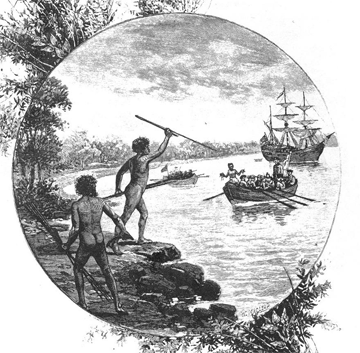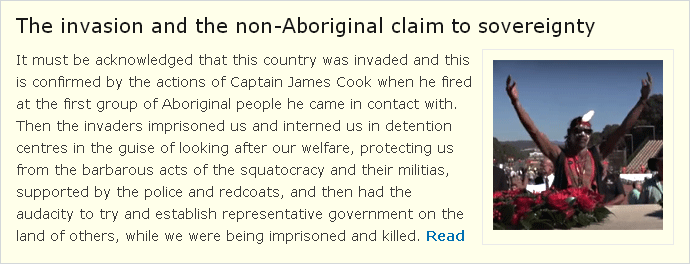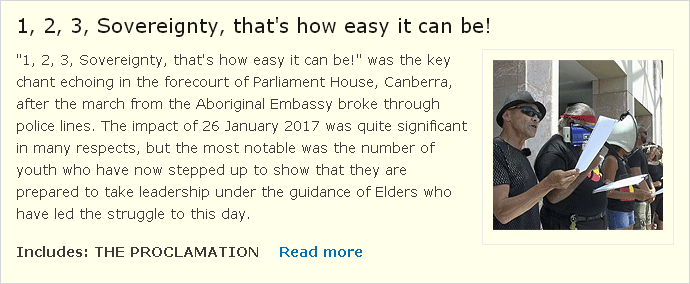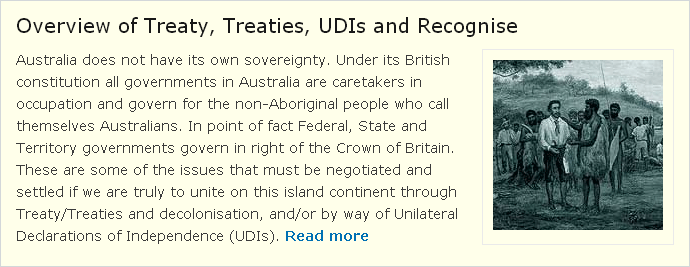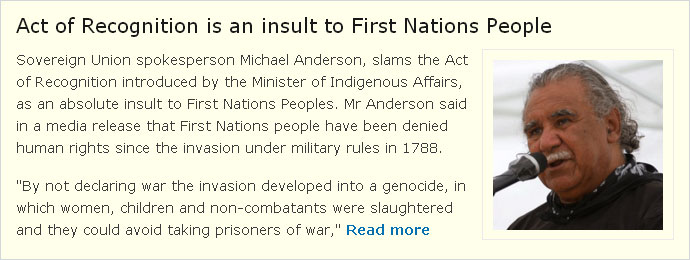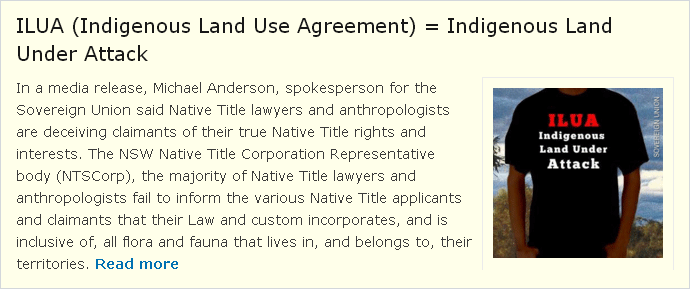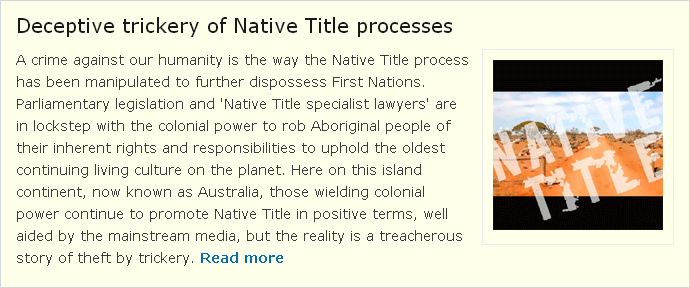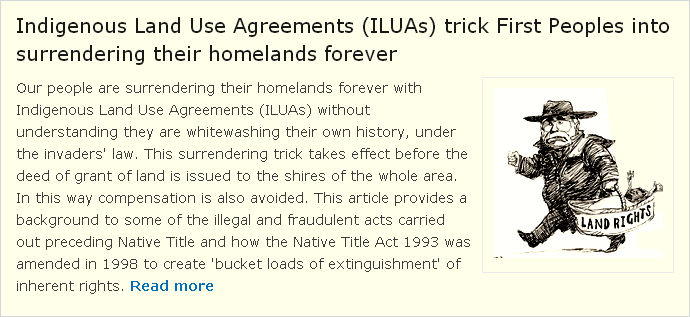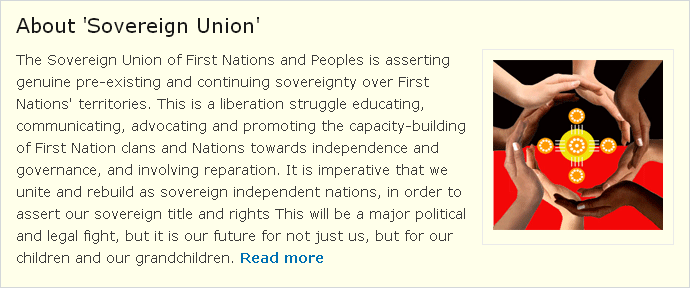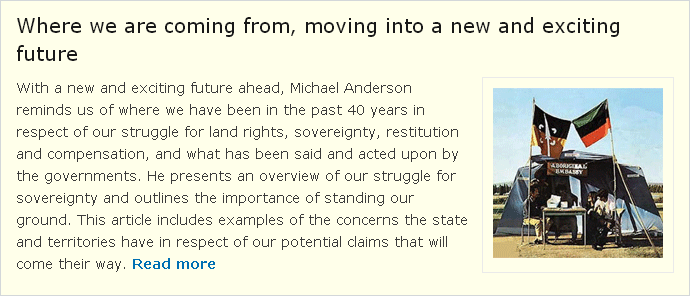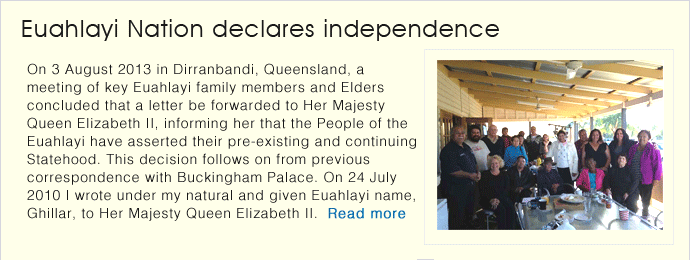Uniting Understanding: Digging deep to the source and denial of contested sovereignties
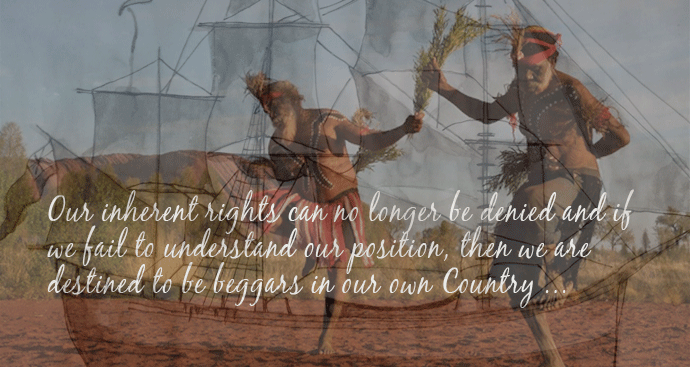
Uniting Understanding: Digging deep to the source and denial of contested sovereignties
Ghillar, Michael Anderson 20 December 2017
We have come to a point where governments and ourselves know that First Nations Peoples continue to be sovereign and independent. Our inherent rights can no longer be denied and if we fail to understand our position, then we are destined to be beggars in our own Country.
(Issued publicly through Facebook)
We need to understand the pathway that we now have to pursue to achieve self-determination and independence as self-governing Nations and Peoples.
The shocking behaviour of Central Land Council staff at an unadvertised meeting at Yuendumu, Walpiri, NT, that was caught on film on 7 December 2017 and circulated on Facebook. Elder Ned Hargraves was knocked to the ground in an attempt to prevent him from joining a 'secret' meeting over a gas pipeline, which the whole community had already said NO to.
'The video is already receiving a lot of attention and highlights a common complaint from Indigenous groups right across Australia of how stand-over and divisive tactics are used to pressure Indigenous groups into entering into deals with mining interests. Quite often in cases like this, the very first signature that approves access or exploration can be used later as consent for larger projects.'
This article aims to dig deep so that we begin to understand the motives for this total disrespect for Owners/Traditional Owners and Senior Lawmen.
Governments' dire need to include First Nations in their colonial constitution
We now need to understand some hidden factors which underpin the Commonwealth Government's dire necessity to include First Nations Peoples in Australia's Constitution and why lands claimed through the Native Title process end up defined as the 'surrendered area', that is, lands handed over to the control of the colonial power by the stroke of a pen.
To do this we need to revisit some basic facts.
Cook failed to comply with his Instructions from the British Crown to take the land with consent in any inhabited places he may locate. Cook's journals and his scientists on board reveal that he failed to comply with his Instructions.
Later Governor Phillip was instructed by the British Crown to conciliate the affections of the inhabitants (natives) when setting up the penal colony in 1788. He never did this.
Now let's put these two incidents into perspective.
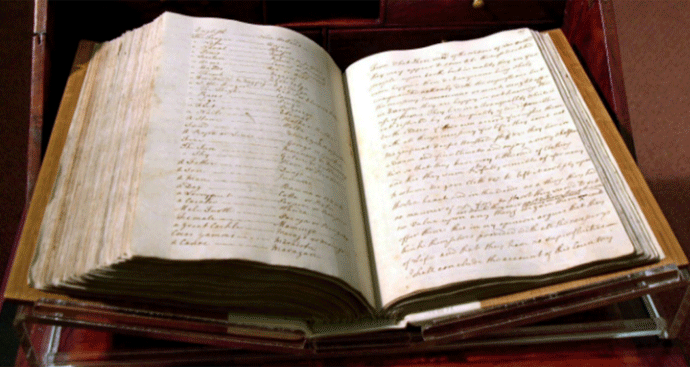
James Cook's Journal during his First Voyage - H.M. Bark 'Endevour' 1768-71
Historical background
In his Journal of 22 August 1770 Cook claims to have hoisted the flag on Possession Island.The First Fleet set out for New Holland on the false assumption that Cook had successfully negotiated taking possession of a certain location(s), but as it turns out, in reality, the mainland of the island continent of Australia was only allegedly annexed to Possession Island on 22 August 1770.
in order to be better informd I land^ed with a party of Men accompan'd by Mr Banks and Dr Solander and land upon the Island which lies at the SE point of the Passage: before and after we landed Anchor'd we saw a number of People upon this Island arm'd in the same - manner as all the others we have seen except one man who had a bow and a bundle of Arrows the first we have seen on this coast. from the appearence of these People we expected they would have opposed our landing but as we approached the Shore they all made off and left us in peaceable posession of as much of the Island as served our purpose.
...I now once more hoisted English Coulers and in the Name of His Majesty King George the Third took posession of the whole Eastern Coast ...
Previously, Cook stated in his Journal that when he first came onto the mainland on 28 April 1770 he fired shots at those who confronted him, because the local inhabitants rejected his approach.
A Musquet loaded with small shot was now fird at the Eldest of the two who was about 40 yards from the boat; it struck him on the legs but he minded it very little so another was immediately fird at him; ...
Cook also stated that he left trinkets of various kinds for the local inhabitants, but his writings record that when he returned what he had 'thrown' were still where they were left.
1770 April 28:
We therefore threw into the house to them some beads, ribbands, cloths etc. as presents and went away.
1770 April 29:
An engraving by Andrew GarranNo signs of people were to be seen; in the house in which the children were yesterday was left every individual thing which we had thrown to them;
Cook summarised how unsuccessful his attempts to 'formally purchase' the land with trinkets were. He reflected on his emerging understanding of the benefits of our highly developed and cultured social structure, governance and Law.
... From what I have said of the Natives of New-Holland they may appear to some to be the most wretched people upon Earth, but in reality they are far happier than we Europeans;
... They live in a Tranquillity which is not disturb'd by the Inequality of Condition: The Earth and sea of their own accord furnishes them with all things necessary for life; they covet not Magnificent Houses & Household-stuff &c., they live in a warm and fine Climate and enjoy a very wholesome Air, so that they have very little need of clothing and this they seem to be fully sensible of, for many to whom we gave cloth, left it carelessly upon the sea beach and in the woods as a thing they had no manner of use for. In short they seem'd to set no Value upon any thing we gave them, nor would they ever part with any thing of their own for any one article we could offer them; this, in my opinion argues that they think themselves provided with all the necessities of Life and that they have no superfluities.
In British common law of contract Cook had made an offer under Instruction from the British Crown, but clearly the offer was rejected by inhabitants of mainland Australia where he made contact. It cannot therefore be argued by anyone that there is any legal right for the Crown to occupy our lands, because there was no acceptance by First Nations Peoples of any contractual offers made by Cook.
Next we come to Governor Arthur Phillip who established of the British penal colony at Sydney Cove in 1788. He was born in London on 11 October 1738 and his 'father was Jacob Phillip, a native of Frankfort in Germany'.
Phillip arrived with the First Fleet on the premise that Cook had done the right thing in taking the lands with consent.
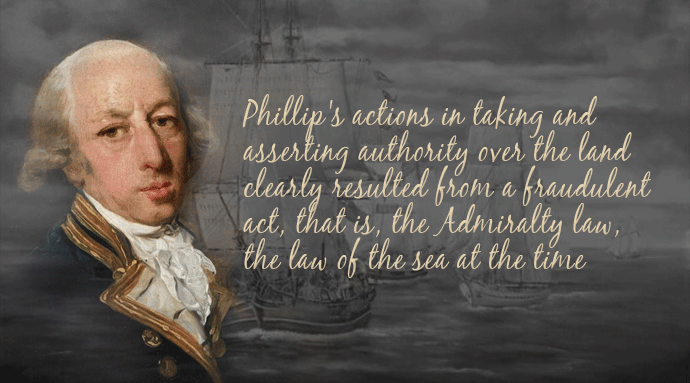
Image: Governor Arthur Phillip
Phillip's actions in taking and asserting authority over the land clearly resulted from a fraudulent act, that is, the Admiralty law, the law of the sea at the time, required that any armed personnel coming onto new lands had to be welcomed by the local inhabitants under their existing law of the land originated in mediaeval times when personnel carrying weapons had to request permission to enter a town or castle. But this did not happen at Port Jackson. Phillip fudged the whole process even though he was very aware the land was already inhabited. Instead, Phillip landed the convicts and instructed them to go to a cleared space and wait for him and his armed forces to arrive.
'The Royal Commission was then read by Mr. D. Collins, the Judge Advocate. By this instrument Arthur Phillip was constituted and appointed Captain General and Governor in Chief in and over the territory, called New South Wales;' and the entire east coast of the continent and westward to the 135th parallel longitude.
This act by Governor Phillip and the fledgling colonial authority constitutes a major criminal fraud against First Nations Peoples, because he was never invited, nor welcomed onto the land by the original owners. He certainly was never given permission to carry weapons into the First Nations lands, and so began armed conflict, dispossession, usurpation, ethnocide, genocide and other crimes against the humanity of Aboriginal Peoples.
There are court cases in Britain, which rule that even the monarch loses title to any claim that has been proven to be an act of fraud.
Moreover, 'If the King is deceived by misinformation of his interest his grant will be void.'
In no way can the Crown legitimise, then or now, the Crown's right to assert sovereignty over our lands. It was indeed an invasion and our lands continue to be occupied by a foreign colonial power. In fact, all the Crown's land grants are invalid.
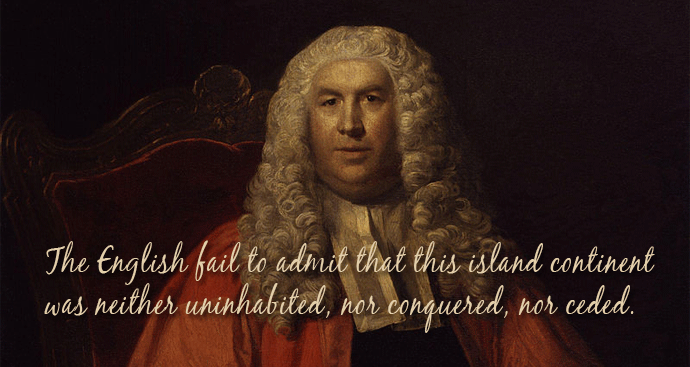
Image: William Blackstone
First Nations Peoples have never been British Subjects
Basing their argument on Blackstone's Commentaries of 1765, poorly trained lawyers in Australian courts have argued that where a Englishman goes his English law follows, but they fail to admit that this island continent was neither uninhabited, nor conquered, nor ceded.
" if an uninhabited country be discovered and planted by English subjects, all the English laws are there immediately in force. For as the law is the birthright of every subject, so wherever they go they carry their laws with them. But in conquered or ceded countries, that have already laws of their own, the king may indeed alter and change those laws; but, till he does actually change them, the ancient laws of the kingdom remain...".
Blackstone clearly defines the difference in legal position between uninhabited lands and inhabited lands. We argue that 'the laws of the ancient kingdom remain' with the First Nations Peoples and are the true common law of the continent. No monarch can change our ancient Law of the Land, since our lands have been inhabited since time immemorial, and are neither conquered, nor ceded.
In the case of the New South Wales colony there was tribal Law that already existed. It was an ancient Settled Law, the Law of the Land. The colonisers were in fact the intruders and should have been subjected to our Law of the Land, but the aggressors, backed by the military, gave protection to their wrong doers when our people went after the invading Law-breakers. For attempting to punish those who broke our Law, our people were punished as the criminals.
The aggressors, in fact, act against the King's Instructions to Phillip dated 25 April 1787:
" You are to endeavor by every possible means to open an intercourse with the natives and to conciliate their affections, enjoining all our subjects to live in amity and kindness with them. And if any of our subjects shall wontonly destroy them, or give them any unnecessary interruption in the exercise of their several occupations, it is our will and pleasure that you do cause such offenders brought to punishment according to the degree of the offence "
In Australia's case the Englishmen were only protected by Admiralty law/Military law. In fact, common civil law did not come into the colonial legal system until after 1828, when the courts were classified as Ecclesiastical courts, in other words, courts of the people.
But this mindset underlies our incarceration rates, the highest in the world, because the authorities are 'criminalising otherness'.
Introduction to legal system of terra nullius - land belonging to no-one
So it is to the New South Wales Supreme Court case of Jack Congo Murrell, 1836, that we must return, where it was held by Justice Forbes that Murrell could be tried, because he now came under the protection and jurisdiction of the Crown.
Murrell's legal representatives then put it to the Court that if it was a legal fact that Murrell was a subject of the Crown, then Murrell and his People should be compensated for the lands that were being usurped by the British colonialists. Instead, Justice Forbes sought to dispense with this proposition and alleged that the 'natives' had no settled law of their own, nor did they have the capacity to govern.
It was reported that he went on to determine, in effect, that the 'natives' had not yet reached a level of civility to be a civilised society that would warrant any serious thought about any inherent rights they may have.
See pdf: Aboriginal Sovereighty Book Kevin Gilbert
Justice Forbes established the concept of terra nullius within Australian law for the first time. His ignorance of our complexly civilised Law and governance is due partly to the fact that only one person in the colony could speak the local languages, according to Saxe Bannister, the first Attorney-General of New South Wales, who gave evidence to the British Parliamentary Select Committee to the 1836/37 British Parliamentary House of Commons Report from the Select Committee on Aborigines (British Settlements.
It is important to note that R v Murrell 1836 was the first case on the question of jurisdiction after civil law was brought into the colony by the British Parliament and its legacy underlies the current government policies against First Nations Peoples, as summed up by John Cook in 1891:
"If we are born in Australia, we are only usurpers here for if we take away people's property without paying for it it does not matter much how we beautyfully (sic) try to cloak it - it is, and always must remain stolen property."
Local inhabitants must be part of law-making
In the 1840s, when Billy Wentworth and other free settlers attended England to negotiate for the establishment of a New South Wales Legislative Council to govern with the Governor, the British Parliament had enormous difficulty in reconciling this proposition. The problem was centred around the fact that because Australia was already inhabited with settled Law, prior to the British arrival, any constitutional and legislative development would be invalid, unless it included the local inhabitants in the development of that legislature and the constitution.
Britain empire had learnt that any such colonial regime established in their name would be illegal because the land was already inhabited with 'laws, customs and traditions of their own'. In fact, the British indicated that the model of legislative development in India should have been followed, where they included the local inhabitants into the legislative process from the outset.
It is these failings that deny Australia its own sovereignty, which is why the Commonwealth of Australia and its colonial States continue to rule in right of the Crown of England, under the British claim to sovereignty to this island continent and its adjacent islands, e.g. all Commonwealth laws have to be assented by the Queen's representative in Australia, the Governor-General, who is also Commander-in-Chief of the army, navy and airforce.
Over $800 million to secure the stolen property - via Referendum Council & Recognise
Professors on Referendum and Sovereignty
From this historical background we can now understand why the Federal government and the mining companies spent over $800 million trying to achieve Aboriginal and Torres Strait Islanders' inclusion in the Australian Constitution. It was being done to legitimise the Commonwealth of Australia's governance and to negate First Nations Sovereignty.
Had the Referendum Council managed to successfully coerce First Nations Peoples to support a referendum, Prime Minster Turnbull and his Republican Movement would then be able to wipe the slate clean and demand Britain surrender its claim to sovereignty over Australia and transfer all sovereign rights to the new Australian Republic.
A relevant historical background can be found in the African experience with countries like Nigeria, where treaties were originally treaties of commerce and trade, which led to the recognition of the sovereignty of the tribes and Peoples whom Britain had treatied with after the slave trade ended.
In these treaties the 'native' Peoples acquiesced by entering into trade deals and commerce. The British took control without the African people really knowing how Britain functioned as colonisers. They had ceded their own sovereignty on the basis of inclusion and reconciliation for the purpose of commerce. Nevertheless, the evolution of constitutional democratic republicanism in Africa was achieved after the British treatied with the local inhabitants.
As Nigeria approached self-government leaders of minority groups became more articulate and insisted in their demands either for constitutional safeguards or for separate states of their own. The reason is apparent. Self-government meant that power would pass from British to Nigerian hands, that is, to the hands of those Nigerians able to command the majority in the existing political subdivisions, the regions.
Our objections to constitutional recognition were indeed premised on the same principal as Nigeria, that is, the Commonwealth government had to gain the consent of each individual First Nation. To do otherwise would have meant a complete rejection of our First Nations' sovereignty and internal leadership, which would have resulted in major personal and political conflict between the First Nations Peoples themselves throughout this island continent.
Until our Peoples fully understand the nature of this high level politicking and the requirements of modern international law, our mobs will be cheated of everything they are entitled to.
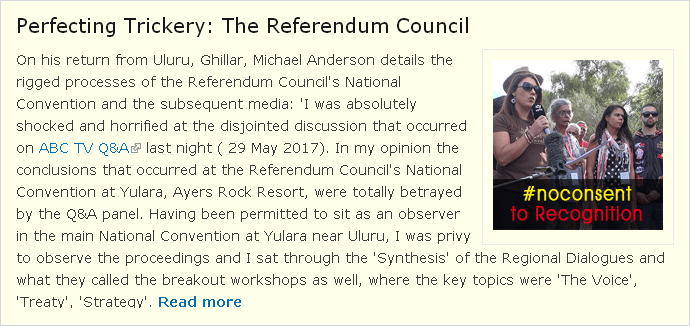
Sovereign Union Media Release 31 May 2017
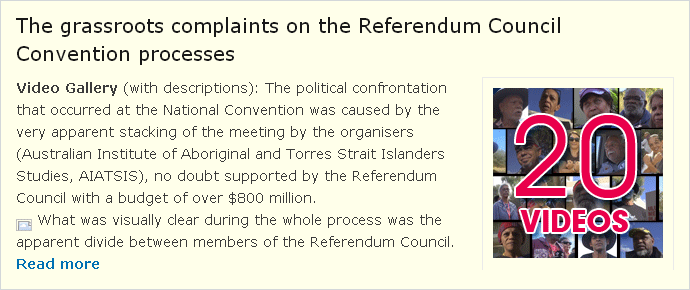
Sovereign Union Media Release 13 June 2017
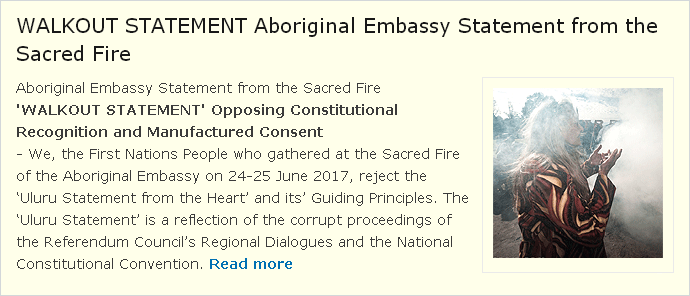
Sovereign Union Media Release 6 July 2017
ILUAs - Indigenous Land Under Attack
I repeat my call to all our people who have gone through the Native Title process:
Reread and review your ILUAs - Indigenous Land Use Agreements - so you understand them word for word.
You need to understand why they ask you to surrender all future claims.
Answer: You are signing away your claimants' rights to the remainder of your Country.
Please ask: What is intended by the inclusion of the term 'surrender'. What are you surrendering and why? Or better still: What have you surrendered and why?
You also need to ask: What is intended and meant by the clauses in the ILUAs that say, 'you validate all past acts'.
Answer: You have signed away any reparation and compensation for all the wrongdoings perpetrated by the invaders, including the theft of your lands and resources.
You also need to ask: What is intended and meant by all future local, state and Federal government development proposals are to be considered 'past acts'.
Answer: If you consent that all 'future acts' are to be considered 'past acts' you are giving free reign to all future development of your lands by outsiders, who will not be required to pay compensation and can develop the land and extract resources as though you don't exist, as though the land is terra nullius. That is you lose all future negotiation rights.
You also need to ask the question: Why you were deceived and lied to by the lawyers representing Native Title services around this country, when they said that freehold land and perpetual pastoral leases extinguish any Native Title claims.
Answer: The High Court never said that in Mabo. The High Court actually said:
It is far too late in the day to contemplate an allodial or other system of land ownership. Land in Australia which has been granted by the Crown is held on a tenure of some kind and the titles acquired under the accepted land law cannot be disturbed. [at para 49 - emphasis added.]
This appears to be clear contradiction to what was also held in that judgement and that is:
But it is not a corollary of the Crown's acquisition of a radical title to land in an occupied territory that the Crown acquired absolute beneficial ownership of that land to the exclusion of the indigenous inhabitants. [at para 51 emphasis added]
Haunting ghost of terra nullius - land belonging to no one
Now it is true that the Federal Parliament and State Parliaments can pass laws to consolidate land tenure laws, but those laws must reflect, by way of an amendment to the land tenure laws of the State, that these amendments intend to extinguish any Native Title claim to all of the lands, both past and future. In the original State land tenure laws at NO time was the intention prescribed that when granting these tenures Aboriginal/Native Title to those lands was extinguished. This was never specified because when the laws were written the lands were defined as terra nullius, belonging to no-one. We were not considered human with laws and governance of our own.
It is therefore false and misleading to be told that we are NOT entitled to claim any form of compensation for the original theft of those lands and for the wrong doings perpetrated against First Nations Peoples. Thus the Native Title request to surrender all future claims and to validate past acts is cheating us and robbing us blind while we have our eyes wide open.
In English black letter law it is a requirement that the original legislature is specific, that is, the granting of the various types of land tenure intended to take away any proprietary rights and residual rights that First Nations have in our lands.
Guess what people, if they had included this intention, or, in the alternative, the governments now amend their land law legislation to reflect that that was their original intent, all State and Territory governments in this country will then be up for mass compensation payouts at today's land values.
They messed it up from the beginning by failing to see us as sovereign and self-governing Nations of Peoples. Terra nullius is the legacy of the original invasion
The ghost of terra nullius comes back and to haunt them.
Now we need more grassroots Blackfellas who understand this reality and to spread the word that because the colonial land laws never legislated any intent to extinguish any claim of right that First Nations Peoples had to the land, they cannot now argue that the granting of the original tenures did intend to extinguish any claim of right that we had over those lands. To argue this fact is to argue a legal myth.
Uncertainty and ambiguity are not acceptable in the legal system, even to this day. So the governments and their Native Title legal advocates are deceiving us big time. The courts should strike out the ambiguities and uncertainties.
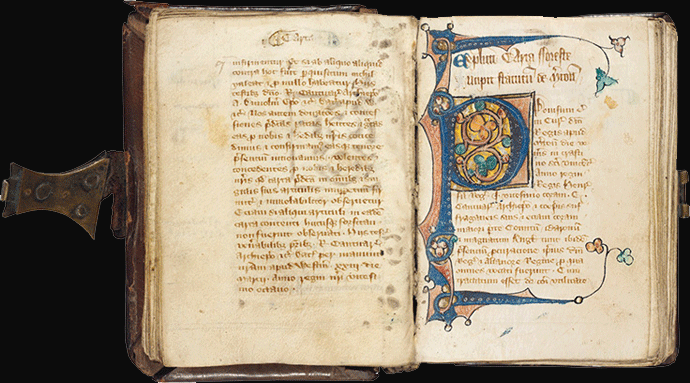
The Magna Carta 1215 - the root of British common law
High Court breaches Magna Carta by denying justice to First Nations
The High Court in Canberra proudly displays the Magna Carta 1215, which is the root of British common law, and focuses on clauses 39 and 40, but its judges are in breach of these clauses when it comes to our situation and the Mabo decision, among others. When there was a 'just compensation' case related to the NT Intervention, the High Court permitted a 'demurrer' to effectively gag the proceedings in Wurridjal v The Commonwealth of Australia [2009] HCA 2 (2 February 2009).
In Mabo (No. 2) the judges placed maintenance of the skeletal framework of the colonial system over and above our inherent right to justice and our lands.
43. However, recognition by our common law of the rights and interests in land of the indigenous inhabitants of a settled colony would be precluded if the recognition were to fracture a skeletal principle of our legal system. The proposition that the Crown became the beneficial owner of all colonial land on first settlement has been supported by more than a disregard of indigenous rights and interests.
This makes a mockery of any justice in the legal system for First Nations and Peoples. The decision is absolutely racially discriminatory. It is bad law that cannot stand, especially when rooted in racism.
This is why the United Nations condemned Australia's Native Title Amendments of 1998 and placed Australia on the 'Early Warning and Urgent Action' procedure and concluded Australia should reset its relationship with First Nations. (see below).
Howard's Bucket loads of extinguishment
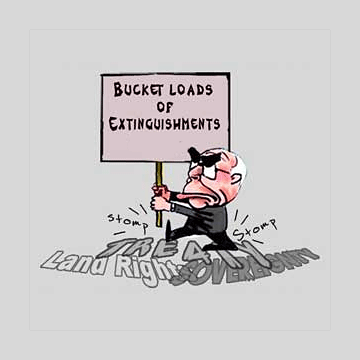
Howard's Bucket loads of extinguishment
In 1998 when former Prime Minister John Howard proposed his Ten Point Plan to amend the Native Title Act 1993, the former Deputy Prime Minister and Nationals leader, Tim Fisher, ran around the country boasting to all his white farmer and city mates that John Howard's Ten Point Plan would bring 'bucket loads of extinguishment'.
This is why Howard suspended the Racial Discrimination Act, 1975 from applying to these 1998 amendments. Otherwise the States and Territories would have had to pay massive amounts of compensation for the lands they argued had now had Native Title extinguished.
Taking Native Title and Racial Discrimination to the UN
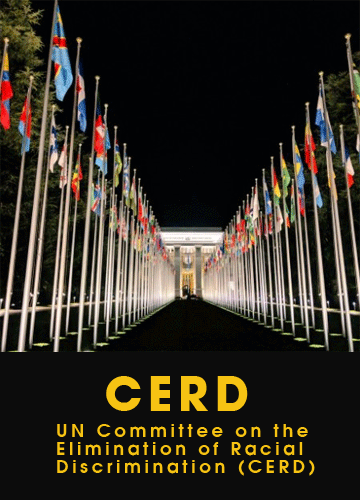
In response to Howard's Ten Point Plan, the Sovereign Union and leading Black federally funded organisations, e.g. ATSIC, Aboriginal and Torres Strait Islander Commission, together with international NGOs made submissions to the CERD, UN Committee on the Elimination of all forms of Racial Discrimination, and objected to and lodged concerns about Howard's 1998 amendments to the Native Title Act 1993. In response the CERD made important concluding observations:
On 18 March 1999 the CERD's conclusions threw the Australian Government into a spin because it was the first western nation to be condemned for racial discrimination. Added to this Australia was placed on the CERD's 'Early Warning and Urgent Action' procedures, which monitor UN Member States which are committing, or are at risk of committing, genocide:
3. The Committee recognizes that, within the broad range of discriminatory practices that have long been directed against Australia's Aboriginal and Torres Strait Islander peoples, the effects of Australia's racially discriminatory land practices have endured as an acute impairment of the rights of Australia's indigenous communities. . . .
6. The Committee, having considered a series of new amendments to the Native Title Act, as adopted in 1998, expresses concern over the compatibility of the Native Title Act, as currently amended, with the State party's international obligations under the Convention. While the original Native Title Act recognizes and seeks to protect indigenous title, provisions that extinguish or impair the exercise of indigenous title rights and interests pervade the amended Act. While the original 1993 Native Title Act was delicately balanced between the rights of indigenous and non-indigenous title holders, the amended Act appears to create legal certainty for Governments and third parties at the expense of indigenous title.
7. The Committee notes, in particular, four specific provisions that discriminate against indigenous title holders under the newly amended Act. These include the Act's "validation" provisions; the "confirmation of extinguishment" provisions; the primary production upgrade provisions; and restrictions concerning the right of indigenous title holders to negotiate non-indigenous land uses.
8. These provisions raise concerns that the amended Act appears to wind back the protections of indigenous title offered in the Mabo decision of the High Court of Australia and the 1993 Native Title Act. As such, the amended Act cannot be considered to be a special measure within the meaning of articles 1(4) and 2(2) of the Convention and raises concerns about the State party's compliance with articles 2 and 5 of the Convention . . .
11. The Committee calls on the State party to address these concerns as a matter of utmost urgency. Most importantly, in conformity with the Committee's general recommendation XXIII concerning indigenous peoples, the Committee urges the State party to suspend implementation of the 1998 amendments and reopen discussions with the representatives of the Aboriginal and Torres Strait Islander peoples with a view to finding solutions acceptable to the indigenous peoples and which would comply with Australia's obligations under the Convention.
12. In the light of the urgency and fundamental importance of these matters, and taking into account the willingness expressed by the State party to continue the dialogue with the Committee over these provisions, the Committee decides to keep this matter on its agenda under its early warning and urgent action procedures to be reviewed again at its fifty-fifth session.
On 14 April 2005 the CERD concluded:
9. The Committee, while noting the explanations provided by the delegation, reiterates its concern about the absence of any entrenched guarantee against racial discrimination that would override the law of the Commonwealth (Convention, art. 2).
The Committee recommends to the State party that it work towards the inclusion of an entrenched guarantee against racial discrimination in its domestic law ...
16. The Committee notes with concern the persistence of diverging perceptions between governmental authorities and indigenous peoples and others on the compatibility of the 1998 amendments to the Native Title Act with the Convention. The Committee reiterates its view that the Mabo case and the 1993 Native Title Act constituted a significant development in the recognition of indigenous peoples' rights, but that the 1998 amendments roll back some of the protections previously offered to indigenous peoples and provide legal certainty for Government and third parties at the expense of indigenous title. The Committee stresses in this regard that the use by the State party of a margin of appreciation in order to strike a balance between existing interests is limited by its obligations under the Convention (art. 5).
The Committee recommends that the State party refrain from adopting measures that withdraw existing guarantees of indigenous rights and that it make every effort to seek the informed consent of indigenous peoples before adopting decisions relating to their rights to land. It further recommends that the State party reopen discussions with indigenous peoples with a view to discussing possible amendments to the Native Title Act and finding solutions acceptable to all.
In August 2010 the Committee for the Elimination of Racial Discrimination (CERD) accepted our pre-existing sovereignty by recommending treaty negotiations:
15. ... Drawing the attention of the State party to the Committee's general recommendation 23 (1997) on the rights of indigenous peoples, the Committee reiterates its recommendation that the State party increase efforts to ensure a meaningful reconciliation with Indigenous peoples and that any measures to amend the Australian Constitution include the recognition of Aboriginal and Torres Strait Islanders as First Nations Peoples. In this regard, the Committee recommends that the State party consider the negotiation of a treaty agreement to build a constructive and sustained relationship with Indigenous peoples.
But our people need to be very careful when negotiating Treaties, given that Australia still governs in right of the English Crown. We understand self-government in the case of the Australian colonial government, but their obligations to Britain are real and transparent to us.
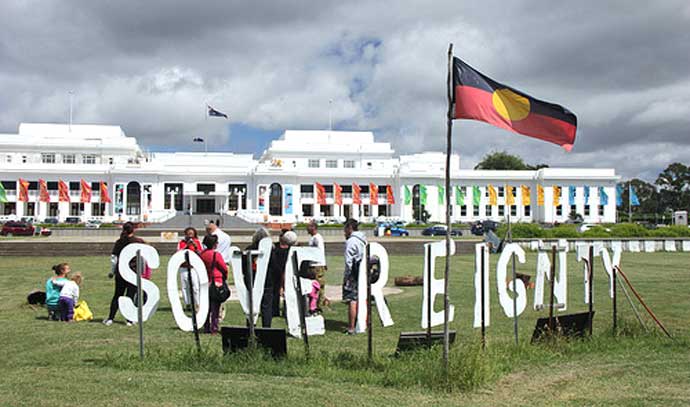
Aboriginal Embassy Canberra - Adjacent to Old Parliament House (in background)
All is not lost - need to endorse uniting strategies
All is not lost, for the world is watching. We just need to come together to endorse a new strategy to strike down their racist laws, so that true justice can be achieved and our Land Rights will prevail.
If we are to leave a positive legacy for our children and our children's children we are obligated, as the old vanguard leaders of the Land Rights Movement, to challenge the validity of those existing land tenures.
With respect to Native Title and land matters the question that arises now is : What powers did the colonial State authorities refer to the Commonwealth under the referral powers of the Australian Constitution. If this was done then we are entitled to be compensated for all those lands the Crown granted after 1975 to farmers, local government and others, including but not limited, to National Parks, native animal refuges, Nature Reserves, Forests and Marine Parks.
by Esther Stanford-Xosei
If your Native Title determination did not show all Vacant Crown Land, Common Lands, Travelling Stock Routes, WateringPoints throughout the claimed areas as existing in 1975, then you were cheated of mass compensation payouts.
To show the States' and Territories' concerns over compensation for seized lands we only have to look at the correspondence between the Chief Minister of the ACT and former Prime Minister John Howard's office, where the Chief Minister of the ACT said that the ACT government could not support his Ten Point Plan of extinguishment if the Commonwealth government failed to give guarantees that the Commonwealth would pay the bill in terms of the compensation required.
So to my Brothers and Sisters - we are being diddled, cheated and lied to. We should by now have available the resources to rebuild our Nations like other Peoples have done around the world when recovering from gross violations of Human Rights.
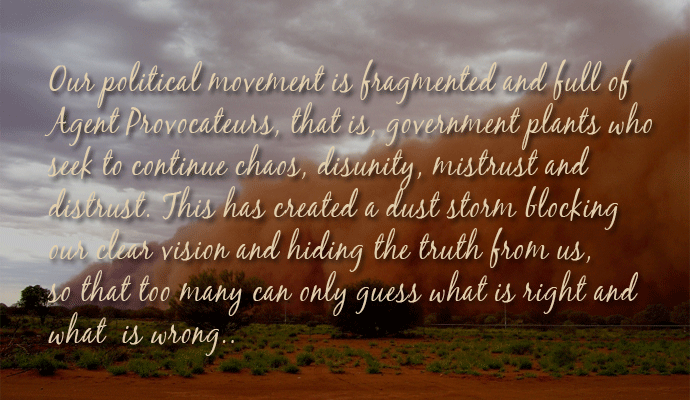
Snakes in the grass
Our political movement is fragmented and full of Agent Provocateurs, that is, government plants who seek to continue chaos, disunity, mistrust and distrust. This has created a dust storm blocking our clear vision and hiding the truth from us, so that too many can only guess what is right and what is wrong.
It is no surprise to note that all those organisations that emerged after the 1980s were established to maintain disunity and dysfunction, while the government centralised power and control of Aboriginal Affairs into the hands of a few selected people around this country and funded them to set up massive institutions.
I alert you to and provide you with this warning: In order to appease all of those who are now disappointed by the failure of Reconciliation and the Constitutional Recognition campaign, I predict that the Australian government's strategists, in concert with the States and Territories, will now turn to these well funded key organisation e.g. Regional Land Councils, the Torres Strait Islanders Regional Authority and Murdi Paaki Regional authority, along with State Land Councils.
I predict that governments will now promote the notion that these bodies are representative of Sovereign First Nations, by virtue of the election or appointment to the Council of various members within that region.
I also predict that the government and those Black organisations will argue that, in the whiteman's world, they are the democratically chosen ones to represent those First Nations and make decisions on behalf of each Sovereign Nation that has representation on those Boards. They will determine themselves to be political Assemblies with all the rights to speak for and on behalf of their appointed members, who come from various Nations within that region or area.
Governments will work toward saying the decisions of the 'Assemblies' are true reflections of self-determination of the First Nations around Australia, as it will be alleged to be the voice of the people at the grassroots level.
I ask you all to take the time to understand this and the ramifications, because if you don't - we will lose.
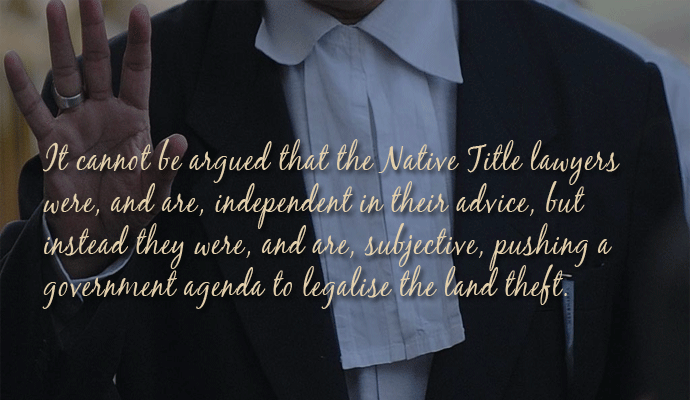
Escape route - getting out from under
There is, however, an escape route to free yourself from fraudulent ILUAs and the potential of these pretended 'Assemblies'.
Organisations representing you in your Native Title process must provide you with independent legal advice separate from the internal and subjective advice given by Native Title lawyers, who do not have the ability to be impartial and objective, because they represent the vested interest of the Crown, which also pays their salaries through line budgeting to the Native Title Representative bodies. It cannot be argued that the Native Title lawyers were, and are, independent in their advice, but instead they were, and are, subjective, pushing a government agenda to legalise the land theft, which is of monumental proportions when we consider the loss that we are experiencing through the amended Native Title Act.
The failure to provide you with independent legal advice so that you had, or have, a full understanding of the intent and consequences of all the land surrender that they ask you to approve, then your alleged 'consent' to surrender your Homeland; to approve all 'past acts'; and to have all 'future acts' classified as 'past acts' cannot stand.
I urge everyone to take a stand against this because the government will argue that you have acquiesced and ceded your sovereign authority over all your country, with the exception of what they approve of you to have, just as the British did with the trade and commerce treaties across Africa.
Testing the system - exhausting domestic remedies
In our Euahlayi case in New South Wales, we made an early Native Title claim in 1998. It was registered. Our boundaries were recognised by the State and Federal Court and our population was recognised as the true sovereign Peoples of our land through our genealogical reports. Later we chose to withdraw our Native Title claim, because we decided not to recognise anything that the Native Title Act prescribed. We made our UDI - Unilateral Declaration of Independence in 2013.
Whilst being very aware that the Native Title process is an acquiescence to an illegal occupying regime, the current Queensland Euahlayi Native Title claim will be used to test the boundaries of all land tenures by using every aspect of the British and Australian legal systems. We must, for political and legal reasons, exhaust all legal and political avenues available to us domestically before we can make it an international argument.
Sovereign Union's advocacy of ideas and strategies
The Sovereign Union started in June 1999 on Mt Kaputar near Narrabri, Gomeroi Nation, and we hosted the first New Way Summit in Canberra during Easter 2011 to reinvigorate the Sovereignty Movement in this modern era.
All our mob seek to locate solutions to their oppression, troubles and problems. Everywhere I have travelled across this part of the continent I find our people consider that they have tried everything to free themselves from the tyranny of being dominated and subjugated by powers outside community and within their community.
Opportunities have come and gone and in this respect the Sovereign Union is calling a Gathering to unite our ideas and strategies that take our people forward to lead to true self-determination and independence.
Asserting sovereignty at many levels is the way forward. You either want to be self-determining and independent or not. The choice is yours.
In this regard, I push the Sovereign Union's barrow of ideas and strategies.
We cannot allow surrender to happen if you don't fully understand the ramifications and consequences of your decision. The Sovereign Union provides a pathway to avoid this.
Unilateral Declarations of Independence (UDIs) can be done by each individual First Nation and it is you and your People who need to define your own boundaries with your neighbours, NOT Native Title, not Land Councils, not Regional Authorities.
Engage in this strategic fight. Talk to your own mob and work together, for without them you will lose. We are rebuilding families, clans, Peoples, Nations.
Our freedom can only be achieved if we are inclusive of our own mobs and reject outsiders. To establish our way of governance first we must be hard and fair. We know the way of accepting outsiders into our Nations. These are our choices we make in our own way in our way. It is every Nation's right to govern according to their Law.
In the words of the inspiring leader Julius Nyerere, who was first President of Tanzania after the former British colony called Tanganyika decolonised in the 1960s. Ossie Cruse, Gough Whitlam and I met with Julius Nyerere at his presidential residence in 1983.
'Development brings freedom, provided it is the development of people. But people cannot be developed, they can only develop themselves. For while it is possible for an outsider to build a man's house, an outsider cannot give the man pride and self-confidence in himself as a human being.'
If you don't decide your future, someone else will make it for you. Is this what we want, or do we free ourselves and take ownership through our own actions?
A core fact that we build from is that Queen Victoria never usurped our sovereignty as stated in the Pacific Islanders Protections Acts 1872 and 1875. This Order-n-Council also included an obligation for this to be made known and gazetted in Australia Law, which was done by Sir Hercules Robinson.
7. Saving of rights of tribes. - Nothing herein or in any such Order in Council contained shall extend or be construed to extend to invest Her Majesty with any claim or title whatsoever to dominion or sovereignty over any such islands or places as aforesaid, or to derogate from the rights of the tribes or people inhabiting such islands or places, or of chiefs or rulers thereof, to such sovereignty or dominion, and a copy of every such Order in Council shall be laid before each House of Parliament within thirty days after the issue thereof, unless Parliament shall not then be in session, in which case a copy shall be laid before each House of Parliament within thirty days after the commencement of the next ensuing session. [2243] ...
10. Proclamation of Act. - This Act shall be proclaimed in each Australasian colony by the governor thereof within six weeks after a copy of it has been received by such governor, and shall take effect in the said colony from the day of the proclamation. [2246]
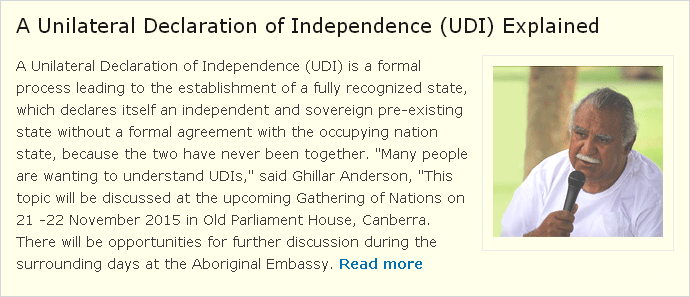
Sovereign Union Media Release 15 December 2011
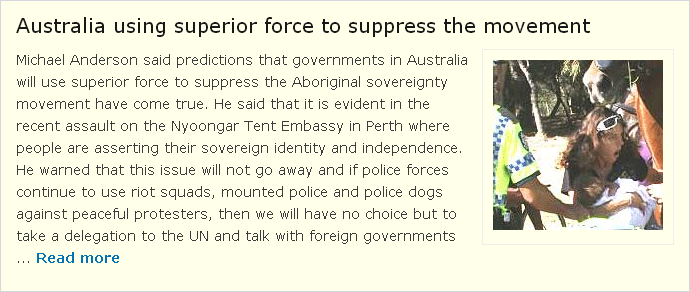
Sovereign Union Media Release 29 July 2012
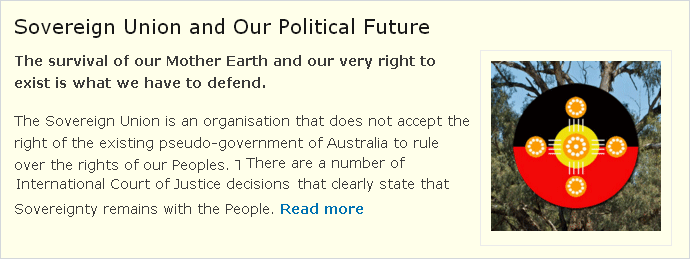
Sovereign Union Media Release 17 November 2013
Prescribed Bodies Corporate - Trap for Owners aka Traditional Owners
We must not forget that we are Peoples who are occupied by a foreign power. Currently, all that we have is subject to the laws of that foreign power. In their world, we own nothing.
We must understand that when Native Title determinations are concluded, the common law holders who have achieved the Native Title determination, may lose their authority over their land, waters and business, because the Prescribed Body Corporate (PBC) organisational structures under the Native Title Act permit non-common law holders, i.e. non-Traditional Owners to become members of that Prescribed Body Corporate.
The consequences generally favour non-Traditional Owners, because of the way in which governments have relocated people from one place to another over the years and so the true Traditional Owners/Owners often lose control of their Prescribed Body Corporate, because they are in the minority in the claimed area.
In this case everybody and anybody in those communities within that defined territory can become members, whether Traditional Owners/Owners or not. In many cases the Traditional Owners/Owners are voted out of the Prescribed Body Corporate and their future participation in that organisation can be blocked, because the constitution permits those who get into power to cancel and reject membership to the Prescribed Body Corporate. To our dismay the Registrar and his delegates in the Office of the Registrar of Indigenous Corporations (ORIC) lives by the black letter law and many Traditional Owners/Owners become the losers in their own land.
Unfortunately, development on and within Native Title lands is authorised against the wishes of the true common law holders. Traditional Owners are considered no longer important. Thereafter outsiders take control and gain authority to sign off on land development and profit from the receipts of the agreement.
Historically we know of those amongst us who consider fighting personalities and individuals to be more important than locating solutions and achieving true self-determination and independence. These agent provocateurs, the detractors, have no solutions. They don't work with communities to find alternatives. They are the killers of ideas and ambitions.
In 1972 Gough Whitlam's Labor election campaign had a slogan 'It's Time'. The Obama campaign in the USA to elect the first Black President had a slogan 'Change we need'. Somewhere between these two, or a combination of both, should become our new slogan. Send us your ideas.
As Sovereign Peoples of this land with all the inherent rights of the original owners, we need to be free of the colonial occupiers' control and charity, sourced from the profits extracted from our Country.
To forcefully assert our ambitions based on our pre-existing sovereignty, we don't need violence, we just need to be smart. We just do it.
In reality, what we have in this country right now are multiple sovereign entities. Again, I emphasise the Two Hundred Years Later, the Senate Standing Committee on Constitutional and Legal Affairs 1983 where the Federal Parliament admitted against that:
It may be a better and more honest appreciation of the facts relating to Aboriginal occupation at the time of settlement, and of Eurocentric views taken by the occupying power, could lead to the conclusion that sovereignty inhered in the Aboriginals at that time. [page 50]
The Land Rights movement with our efforts on the streets in protest ultimately led to Mabo where the full bench of the High Court held:
53. If it be necessary to categorize an interest in land as proprietary in order that it survive a change in sovereignty, the interest possessed by a community that is in exclusive possession of land falls into that category. Whether or not land is owned by individual members of a community, a community which asserts and asserts effectively that none but its members has any right to occupy or use the land has an interest in the land that must be proprietary in nature: there is no other proprietor.
Flags reflect multiple Sovereignties
The fact that the bench of the High Court in Mabo (No.2) recognised our continuing proprietary rights in land is much more significant than our people have been led to believe. While it focuses on our continuing proprietary rights to ALL land in Australia, the judges contended also that legitimate land title as has developed in the last 190 years and this land tenure regime extinguishes our rights.
As I have said already this is not necessarily the case, because the land tenure laws did not qualify in any way their intention to exclude and negate any claims that we may have. We must always remember that all our Law gives us our title to those lands, waters and natural resources. Under our Laws and customs we have power and authority to determine who can be on those lands; who can take from those lands; who can attend religious rituals and ceremonies only at our invitation. This is our system of governance with unquestionable authority.

We had thriving populations and were the first to invent culture. We had civil law and the equivalent of ecclesiastical law well before the British. This was sovereignty. This material fact cannot be avoided.
I therefore argue that the decision in Mabo did, by default, infer that we are sovereign Nations and Peoples, but the High Court could not state this as a material legal fact openly, but by virtue of their judgement they made an admission against interest when they held that contested sovereignty is not justiciable in the municipal/domestic courts:
The Crown's acquisition of sovereignty over the several parts of Australia cannot be challenged in an Australian municipal court. [at para 83]
With this being the case then we might ask: Is the Australian Government and all those associated with it complicit in perpetrating an act of treason against the asserted sovereignty of the British Crown over Australia, by flying the Aboriginal and Torres Strait Islander flags on flag poles throughout this continent, on official government buildings, schools, courts, state Parliament Houses and the Federal Parliament?
By flying our flags in these official places, in particular, above and in the grounds of the courts and Parliament Houses, they are recognising multiple sovereignty with Aboriginal and Torres Strait Islander Nations.
If this was not the case, these flags would have been taken down, never to be flown beside an Australian Commonwealth, State or Territory flag.
The fact that we have these sovereign flags flying together creates a political conundrum, because this recognition of multiple sovereignty means that the Commonwealth, State or Territory Parliaments cannot pass laws for Aboriginal and Torres Strait Islander Peoples, whose sovereignty they recognise as existing and whose laws are now recognised by the common law, courtesy of the High Court decision in Mabo.
The High Court in Canberra symbolises its recognition of our an ancient Law of the Land by prominently displaying the painting by Rosemary Namok, from Lockhart River, Queensland, 2003. The caption reads:
'... but ... that traditional law... it's still there underneath.'
In politics and law, all pieces of legislation, which impact on Aboriginal and Torres Strait Islanders negatively and that which takes away and/or restricts our rights as sovereign Peoples are in fact an act of war against free and sovereign Nations of Peoples and their sovereign States.
It is no wonder State and Territory police are hammering us into submission with impunity at the community levels. Our populations are being forced to submit without knowing the true background to what is going on.
As George Williams, Professor of Law at New South Wales University, said simply on ABC Radio National Big Ideas when asked by an Aboriginal person: How do we get our Sovereignty? (or words to that effect) "Don't ask for it, just assert it."
In this regard I say: You either have Sovereignty or you don't. If you think you don't, you have ceded and/or acquiesced and given it all away. This means you are potentially a hopeless charity case and/or fully assimilated into the colonial world.
There is only one answer left. Take ownership and assert your sovereign authority as a Nation of Peoples made up of families and clans, rather than as an individual. You can't win a war by yourself and we can rebuild out Nations.
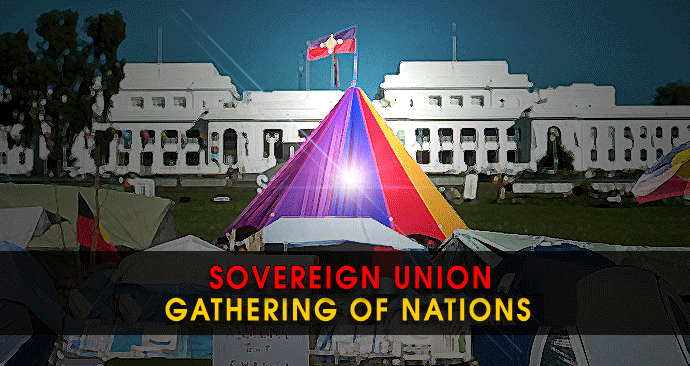 The Sovereign Union is now negotiating to host its National Gathering in Canberra for four days from 21-24 April 2018, followed by the Remembrance of the Frontier Wars march on Anzac Day, 25 April 2018.
The Sovereign Union is now negotiating to host its National Gathering in Canberra for four days from 21-24 April 2018, followed by the Remembrance of the Frontier Wars march on Anzac Day, 25 April 2018.Next Sovereign Union Gathering of Nations, Peoples, Clans and Families
The Sovereign Union is now negotiating to host its National Gathering in Canberra for four days from 21-24 April 2018, followed by the Remembrance of the Frontier Wars march on Anzac Day, 25 April 2018.
We run on a voluntary basis and do not have government funding, but for those Nations who are serious we need true representatives, who will work to unite strategies to go forward with, and true representatives of their Peoples, clans and families on the ground.
We don't need agitators, the 'smashers' who condemn individuals and attack personalities. We have no time to continue with dysfunction and disunity. Just take a step backwards and look at what has already been achieved and what has already been lost because of this very fact. No more. We have all learnt our lessons. When we realise the true motives of these 'smashers' we begin to understand that they are not our friends and will always work to keep our people divided and dysfunctional. So we must ask ourselves then: Who are the losers and who are the winners in this battle?
A lot of good people have withdrawn from or just watch our struggle, because they are tired of our own detractors attacking and tearing good people apart and as a consequence we have lost some great minds and great people to our cause. Many have witnessed what their parents or grandparents have endured. I leave this for you to ponder.
We need those who can work together with others to find a common pathway forward to make our Dreaming and our Law a functioning reality in this modern world.
Today we have younger people who have great minds and powerful enthusiasm with knowledge and ability to take our struggle forward.
The time is now to unite through the positive processes for future independence and self-determination in its many forms.
 Contact: Ghillar Michael Anderson
Contact: Ghillar Michael AndersonConvenor of the Sovereign Union,
Head of State of the Euahlayi Peoples Republic
Contact Details here


